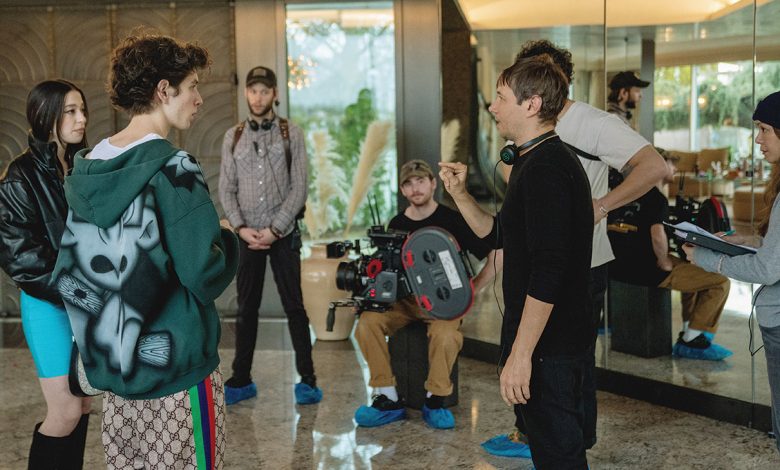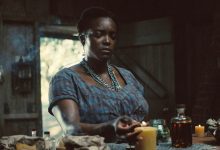Making of ‘Anora’: How Sean Baker Turns the Rom-Com on Its Head

Anyone who’s seen Anora talks about the home-invasion scene.
The 28- minute thriller sequence, a tour de force worthy of Hitchcock, comes about an hour in. Up until then, Sean Baker’s Palme d’Or-winning movie has been an R-rated version of Pretty Woman. “Basically a romantic comedy, maybe a dirty romantic comedy, but a romantic comedy,” says the American indie auteur.
Anora, or Ani, a 23-year-old stripper living in Brighton Beach, Brooklyn, played by Mikey Madison, hooks up with the slightly younger 21-year-old Ivan (Mark Eydelshteyn, who has been called the Timothée Chalamet of Russia), the son of a Russian oligarch. What starts as a sex worker/client relationship — after a lap dance, Ivan asks if he can have Ani “exclusively” for a week — turns into something more. A whirlwind romance, involving a week of wild parties, and wilder sex, ends in Vegas, where Ivan, smitten and enticed by the freedom he thinks a U.S. green card will bring from his controlling parents back in Moscow, asks Ani to marry him. The proposal isn’t quite the Hallmark version. “Three carats,” says Ani, holding up her ring finger, who clearly still sees their relationship as primarily transactional. “What about 4?” counters Ivan. Cue dress/diamond ring/marriage montage.
“I was very conscious of the fact that we were throwing these romantic-comedy tropes at the audience,” says Baker. “For the first hour, I was trying to emulate the basic structure of those types of movies. Then it’s about almost wanting the audience to throw them off and even shattering those tropes.”
When Ivan’s folks hear of the wedding, they flip out. They call Toros, their fixer in Brighton Beach. The reluctant Armenian enforcer, played by Sean Baker regular Karren Karagulian, drops everything (he’s in the middle of a christening for his godson), picks up a couple of goons and heads out to Ivan’s to get this marriage annulled.
But Ivan runs away, leaving Ani alone in the family McMansion. This is where the film pivots. The dirty rom-com, a raunchy take on the “hooker with a heart of gold” films we’ve seen a thousand times, morphs into something much darker and more disturbing (Federico Fellini’s Nights of Cabria from 1957, starring Giulietta Masina as a hard-done-by prostitute with an indomitable spirit, was one of Baker’s major inspirations for Anora).
Toros and his thugs smash their way in and try and force Ani to give up her supposed fairy tale. But sweet and sassy Ani turns fierce and feral, fighting back with any means necessary. The scene goes slapstick action. Lamps smash, glass tabletops shatter. It’s 28 minutes of pure mayhem. What starts funny turns nasty. There’s choking. The goons tie Ani up. She keeps fighting: kicking, punching, biting. And screaming. Screaming a lot.
“When we started shooting that scene, I was upstairs on my computer,” says Anora producer Alex Coco. “All of a sudden I just started to hear these blood-curdling screams from downstairs. One after the other. It was terrifying.”
It was Mikey Madison’s scream that got her the part.
Eydelshteyn was nervous performing in his first American movie but instantly connected with co-star Madison. “That’s just Mikey. If you were on set with her, she’d have instant chemistry with you, too.” Courtesy of NEON
Baker first noticed Madison in Quentin Tarantino’s Once Upon a Time in Hollywood, in which she plays the crazed cultist who goes full Manson on Brad Pitt and Leonardo DiCaprio, a knife-
wielding banshee who keeps coming until she is finally blowtorched. And it was Jan. 14, 2022, when Baker caught the opening night of Matt Bettinelli-Olpin and Tyler Gillett’s Scream sequel — in which Madison plays Amber, a sassy, funny teen who is revealed to be the knife-wielding killer Ghostface — and decided Anora would be his next project.
“After the film, I turned to Samantha Quan, my producer and wife, and I said, ‘We’re calling her reps the minute we step out of the theater,’ ” Baker recalls. “It was the combination of both those roles — she was giving me humor, giving me attitude, and she had the intensity and the physicality Ani needed. And she screamed like crazy in both roles.”
Recalls Madison, “We met for coffee, Sean and Sammy and their two dogs, Bunsen and Bonnie. I was already a fan of Sean’s work and the idea that he wanted to write a film for me was just amazing.”
As Baker sat down to sculpt the script with Madison as Anora, the actress threw herself into preparation.
“I spent months going to clubs and talking to consultants and shadowing dancers,” she recalls. “And physically training because it’s a physically demanding job — you are on your feet the whole time, dancing the whole time.”
Says Baker, “Three, four months out, she started to do pole dancing lessons. Her father even installed a pole in her home.”
Such immersive prep is par for the course on a Sean Baker movie. The director of Tangerine, The Florida Project and Red Rocket is famous for combining scripted scenes with improvisation, throwing his actors, in character, into a world that feels as real as possible.
The opening 10 minutes of Anora, showing Ani working the (real-life) strip club HQ, were entirely improvised.
“We just wanted to be a little fly on the wall, watch Ani work, eavesdrop a little bit,” notes Anora cinematographer Drew Daniels, who shot the film old school, on 35mm magazines using a wide-field anamorphic lens. “We set up, rolled an entire mag, then did it from another angle, rolled an entire mag. Just letting [Madison] get into character, run the floor, showing how the ladies work.”
Adds Madison: “I had a wireless mic and an earpiece for Sean to give me direction, but the music is blasting, people are talking, laughing. So there were times when I couldn’t hear, so I had to just be Ani, walk from client to client, trying to pick them up, have a conversation, talking to my co-workers. I’ve never had a director see me in that way, trust me to want to collaborate on this level. I’ve honestly dreamed of having this kind of relationship with a director for my entire career, but I don’t know if I ever thought it would happen.”
There were times when Baker didn’t think Anora would happen, either. He’d been trying to make a film set in the Russian-Armenian community in Brighton Beach for at least 15 years. Baker became fascinated with the neighborhood through his friendship with Karagulian, who has appeared in all of his films, going back to his student debut, Four Letter Words in 2000. “He’s my Bob De Niro,” Baker jokes.
After making Prince of Broadway in 2008, Baker and Karagulian co-wrote a script for a buddy gangster film about Brighton Beach mobsters.
“We went out to producers, but for the part I was going to play, the Armenian gangster, they wanted someone like Brad Pitt, an American doing an accent,” says Karagulian. “Because Sean is so dedicated to authenticity, he would just refuse them all.”
Instead of going the Hollywood route, Baker carved out an indie path with a string of low-budget dramedies — Starlet, Tangerine, The Florida Project, Red Rocket — that looked at different aspects of sex work. He was still interested in setting a film in the Russian-Armenian community of Brighton Beach, but the idea of doing a gangster film “just didn’t appeal to me anymore,” he says. “To be honest, it never really appealed to me.”
Years later, Baker heard a story about a woman who got kidnapped and held as collateral because her husband, a wannabe Russian American gangster, owed money to the mob. “She realizes she married the wrong man and starts to gravitate toward her captors in a Stockholm syndrome-type thing,” says Baker. “I found that idea very intriguing, but the mob bit didn’t interest me.”
But, he thought, what if the wife was a sex worker and her husband wasn’t a mobster?
“I was on a Zoom call with a Russian American consultant for another project, and I pitched the idea: ‘What if she was a sex worker who married the son of a Russian oligarch?’ She laughed out loud,” Baker recalls. “That was my validation. I knew we had our high-concept plot line, our one-sentence pitch.”
It was clear from the start that Karagulian would play Toros, the put-upon Armenian lackey who has been babysitting spoiled rich-kid Ivan for years. Baker was at the Cannes Film Festival in 2021 with Red Rocket when he spotted Russian actor Yuri Borisov in Juho Kuosmanen’s Compartment No. 6. He quickly cast him to play Igor, a Toros-employed goon who secretly admires Ani’s fighting spirit.
“There are a lot of parallels between Yuri’s character [in Compartment No. 6] and the character in this film,” says Baker. “He’s presented as somebody you assume is this thug, then the stereotype is shattered, and you realize he’s very much a teddy bear.”
Anora’s Russian mobsters Vache Tovmasyan (left) and Yuri Borisov. In keeping with Baker’s obsession with authenticity, all the actors did their own stunts — and their own driving — on set. Courtesy of NEON
It was Borisov who suggested Baker look at Eydelshteyn for Ivan.
“We’d met in Berlin when we both had films in the festival and we’d gone out drinking together,” Borisov recalls. “I thought he had the energy, the character, to fit the part [of Ivan].”
In Russia, Eydelshteyn’s a heartthrob star — “I play the cute romantic guy with the curly hair,” he jokes — but he had never done a role in English. When Anora’s producers asked him to tape an audition, he freaked out.
“They kept asking for the tape, and I said I didn’t have time, but I did have time, it was just scary to me, all these lines in English,” recalls Eydelshteyn. “Finally, I did it in one go and sent it off.”
Eydelshteyn made a distinctive costume choice for his audition. It was the first thing that jumped out at Quan.
“I opened up my laptop, I watched the first 10 seconds and slammed it shut again,” she says. “I called to Sean: ‘You have to see this!’ ”
In the tape, Eydelshteyn is in his apartment, his back to the camera, looking out on the Moscow skyline.
“He was completely naked!” says Quan. “His butt right out there, wearing a beanie, sunglasses and vaping as he delivered his lines.”
Explains Eydelshteyn: “I smoked vape the whole time, so I could take breaks when I forgot my lines. I got nervous, jumping from English to Russian. One time I forget part of the scene, and I start to improvise a freestyle rap, half of English, half of Russian. When Sean saw it, he said: ‘That’s so Ivan! You catch his vibe. Let’s build this character together.’ ”
And why did he do the audition nude?
“Well, I thought Ivan is rich, he should have rich clothes,” says Eydelshteyn, “but I didn’t have the money for those, so I thought, ‘OK, I’ll just go naked.’ ”
Making Anora, the film’s producers faced a similar challenge: how to show the lives of the obscenely wealthy on an indie film budget.
“This is Sean’s first movie that deals with rich people in any way,” says Quan, “and putting people onscreen who look like they have a lot of money costs a lot of money.”
Notes producer Coco: “For costumes on The Florida Project or Red Rocket, a lot of times we could just go to a thrift store. Now we needed a mansion, we needed a suite in Vegas, a private airplane. It became a matter of, by any means necessary. It was: Who knows a billionaire, who knows someone who has a private airplane who will do us a favor?”
While it might seem unlikely given his filmography, Baker knows a fair amount of rich people.
“My circles run wide,” he says. “I can be close to affluence if I want to be. I know people who are worth $800 million because they funded my previous films. I went to school in New Jersey with people who are in the one percent.”
And while he had never previously directed a movie about the extremely opulent, Baker knew what their lives looked like thanks to a gig filming high-end wedding videos.
“When I was around 30 years old and doing whatever I could to stay in the industry, I got a job shooting and editing these high-end, Martha Stewart-level weddings,” he recalls. “A lot of Russian American and Ukrainian American weddings. It really helped in creating that world for Anora.”
When it came to finding Ivan’s family mansion, Anora’s production team lucked out. Baker googled “biggest, fanciest mansion in Brighton Beach.” The first hit was a waterfront compound in Mill Basin once owned by Russian oligarch Galina Anisimova. (His daughter, Anna, was profiled by New York magazine under the headline: “The Russian-American Paris Hilton.”)
“Sean’s like, ‘That’s it, that’s what I want.’ And it was our job to get it,” says Quan. “And, amazingly, we did.”
The HQ, a real Brighton Beach strip club, plays itself in Anora. Courtesy of NEON
The Mill Basin mansion is the stage for that pivotal 28- minute home-invasion scene that transitions Anora from the rough-and-ready comedy improvisation of the first hour into more controlled thriller territory.
“When I first started working with Sean, I thought he was going to be a very run-and-gun director, very improvisational, kind of messy, because that was the image I had of him from seeing his previous films,” says Daniels. “But actually, Sean is a perfectionist. He’s particularly obsessive about the details, very adamant about what he wants in the frame. That really shows in the home invasion.”
Baker and Daniels composed the sequence with clear framing and precise blocking — “almost like a Hong Kong action film” says Daniels. When Toros and his henchmen storm in, the sequence is locked down, with a dolly tracking them in a wide shot.
“Then it shifts halfway through, and it goes into handheld when they’re yanking off Ani’s wedding ring and she’s screaming. It goes crazy,” says Daniels. “Then, when they have her tied up and Toros is negotiating with her to help them go find Ivan, the camera is locked down again.”
Gritty 1970s New York thrillers like The French Connection and The Taking of Pelham One Two Three were a touchstone. To get that look, Baker not only insisted on shooting on film, using vintage Lomo lenses, but tried to shoot every scene “as they would have done in 1973,” says Coco. For an aerial shot of the mansion, instead of using a drone, “we got a helicopter, and just shot two mags, the camera operator hanging out of the door.”
For the mansion’s interior, production designer Stephen Phelps worked mainly with what was on hand. “I found these Versace robes in the bathroom next door and thought, ‘Oh they should wear these,’ ” he remembers. “We got lucky because it was a Russian family who lived there, so their decor and sense of style fit what we were doing. But basically it was about removing a lot of furniture so that we had a cleaner slate, more space to give the place the feel of a cold palace.”
Lighting that palace, Daniels says, was a nightmare.
“So many windows!” he says, shuddering. “The home-invasion scene is 28 to 30 pages of script, and it’s all in real time. We’re shooting for like 10 days straight, and we got every single weather imaginable over those 10 days. On a cloudy day, we had to shoot; on a rainy day and when the sun was blasting in — making that all feel like 30 minutes over one day was quite a feat. It doesn’t look like we’re lighting anything — the idea of the movie was to feel very natural and unlit — but believe me, we’re doing a lot.”
The choreography for the scene was tight, but the dialogue was largely improvised. Ani is talking a mile a minute. When one of Toros’ goons casually calls her a prostitute, she lets loose with a barrage of f-bombs.
“I didn’t want Ani to stop talking, not for a minute. Even if her life is in danger, she’s not going to back down,” says Madison. “So yeah, that sequence was exhausting to shoot.”
Not so the many often-athletic, always hilarious sex scenes that mark Ivan and Ani’s courtship. The first plays like a goofy dance sequence: Ivan doing a summersault on the bed, stripping off his pants in the process, something Eydelshteyn came up with on the spot and Baker decided to put into the film.
“The atmosphere on the set for the sex scenes was really funny because that was their function — to be fun,” says Eydelshteyn. “It’s part of Ani and Ivan’s celebration, the first part of their fairy tale.”
For each sex scene, Baker and Quan would demonstrate the position, note the camera angle and break down the shots. “It was usually one shot, not a whole sequence; they were less sex scenes than sex shots,” says Quan. “We’d do a couple of takes and move on. Sean was very clear he would never show anyone in a way that would feel exploitative or unflattering, that would see them as objects.”
“The scenes were funny and fun to shoot,” adds Madison. “Sean is dedicated to portraying sex work in a real and honest way, and I think it’s good to see Ani doing her job.”
For Baker, demystifying and destigmatizing sex work — be it the transgender streetwalkers in Tangerine, the washed-up porn star of Red Rocket or the single mom in The Florida Project turning tricks to make ends meet — has become something of a mission. At the press conference for Anora in Cannes, Baker called for decriminalization of all sex work. “It’s a livelihood, it’s a career, it’s a job, and it’s one that should be respected,” he said.
But his focus on the profession in his films has as much to do with cinematic history as with social justice. Anora deliberately evokes the movie tropes of rom-coms in order to subvert them, to tell stories, says Quan, “that he feels just aren’t getting made in Hollywood.”
Baker (left) encouraged Eydelshteyn to improvise dialogue. “I played with my English, saying, ‘Firstly, twicely, nicely twicely.’ Anything to sound funny.” Courtesy of NEON
Anora definitely doesn’t get a Hollywood ending. By the final reel, Ivan has flown back home to Russia and Ani’s dream marriage is bust. She’s had to relinquish her 4-carat engagement ring. Igor, thug turned almost ally, is driving Ani back to her dingy Brooklyn apartment. But Igor has managed to pocket that 4-carat ring. He hands it over. In the film’s final and most controversial scene, Ani initiates sex with Igor in the car. Midway through, he stops her, holding her as she breaks down and cries.
“Everyone’s talking about the 28-minute home-invasion scene, but that final scene was actually the hardest to shoot,” says Coco. “So much had to happen in order to pull that off. It was planned as a half-day shoot, and we ended up shooting it over three days.”
Says Baker: “It was the moment I felt all the pressure of the world on me. I had this ending in my head very early on, working with this Stockholm syndrome thing about Ani gravitating toward her captor, but I wanted to take it to another level and really explore the complexity of the moment to interpret the intimacy. It was designed to be interpreted. But at the same time, I still needed to nail all the cues, all those technical and emotional cues.”
There were four of them packed into the tiny car: Mikey and Yuri up front with Daniels filming, framing the pair in a tight two shot, and Baker in the back seat watching the monitor. Production designer Phelps was on the roof, shaking a cardboard box of fake snow over the windows so that the drift would slowly pile up during the scene.
“We tried to shoot it for multiple days, and there was always something wrong, the lighting, the snow, the windshield wipers,” says Madison. “It was the culmination of so much emotion, when Ani releases all the feelings she’s been holding in for so long, and I found myself in a similar headspace, very vulnerable and scary.”
Says Baker: “I remember that one take, when she sheds that single tear, and it was like Nights of Cabria, where Giulietta Masina has that single tear in the end. It was like an unintentional nod toward film that helped inspire it. But I still wasn’t sure, wasn’t 100 percent sure, until I saw the dailies. And then I thought, ‘Yeah, I think we got it.’ ”
Source: Hollywoodreporter
Related Posts
- Roundball Rocked: With NBA Return Looming, NBC Purges Scripted Roster
- SoundCloud Says It “Has Never Used Artist Content to Train AI Models” After Backlash on Terms of Service Change
- Fox News’ Camryn Kinsey Is “Doing Well” After Fainting on Live TV
- Kerry Washington and Jahleel Kamera in 'Shadow Force.'
Courtesy of Lionsgate
…
- This Alternative Artist Landed a Top-20 Chart Debut With an Album Made Almost Entirely on His Phone





